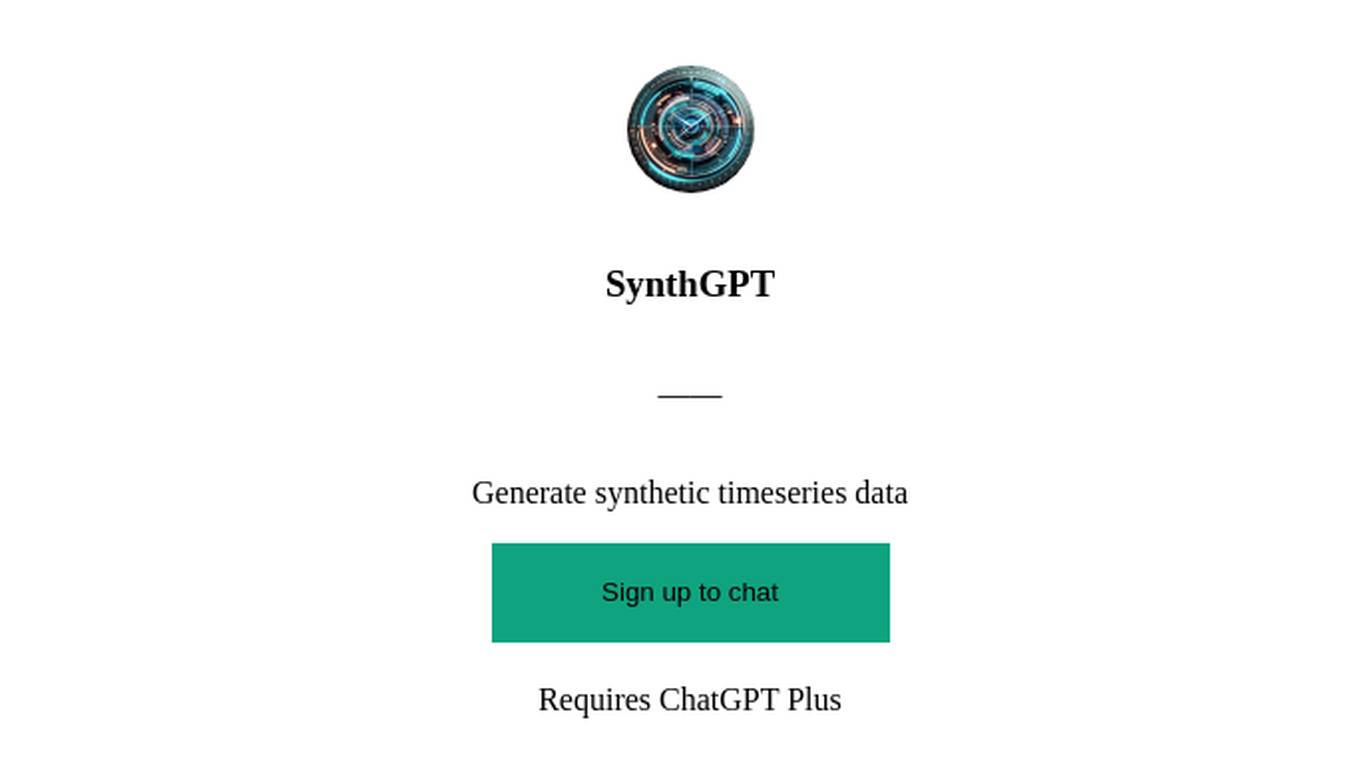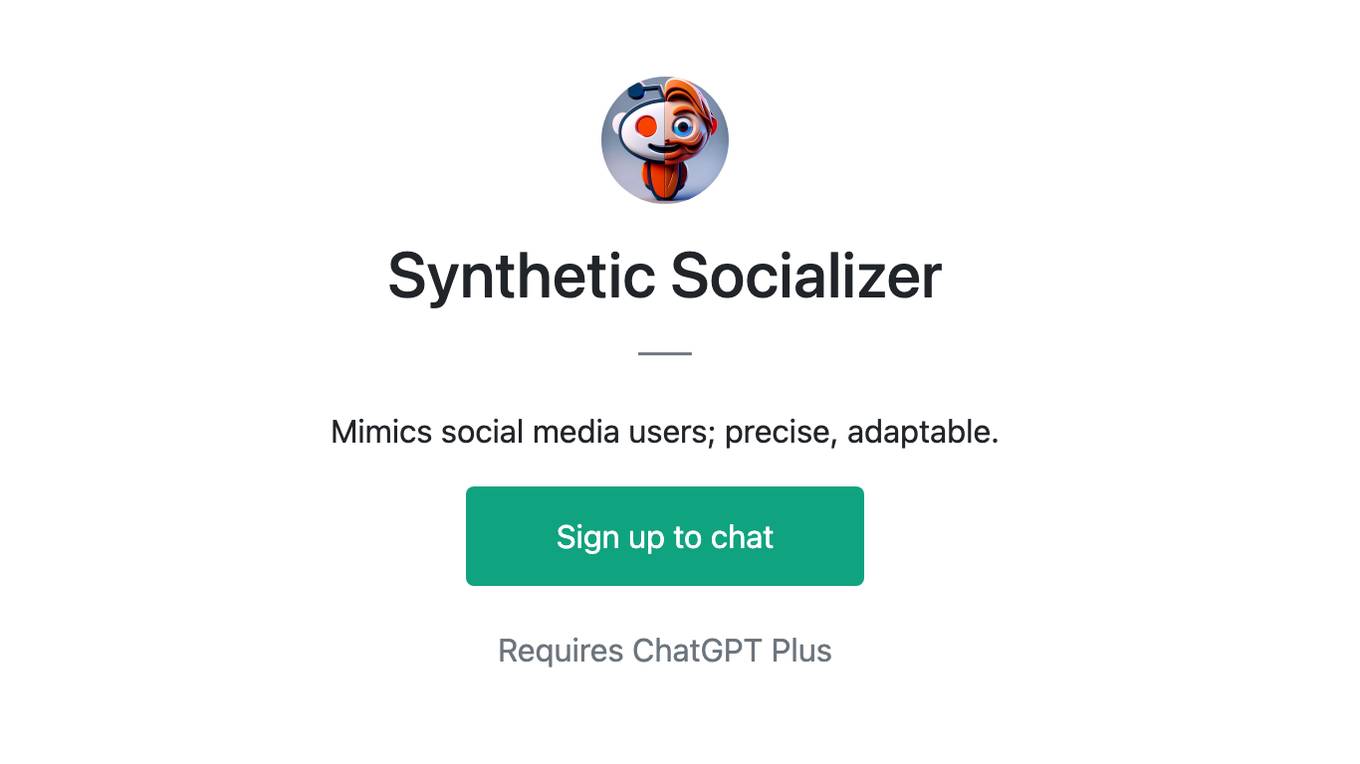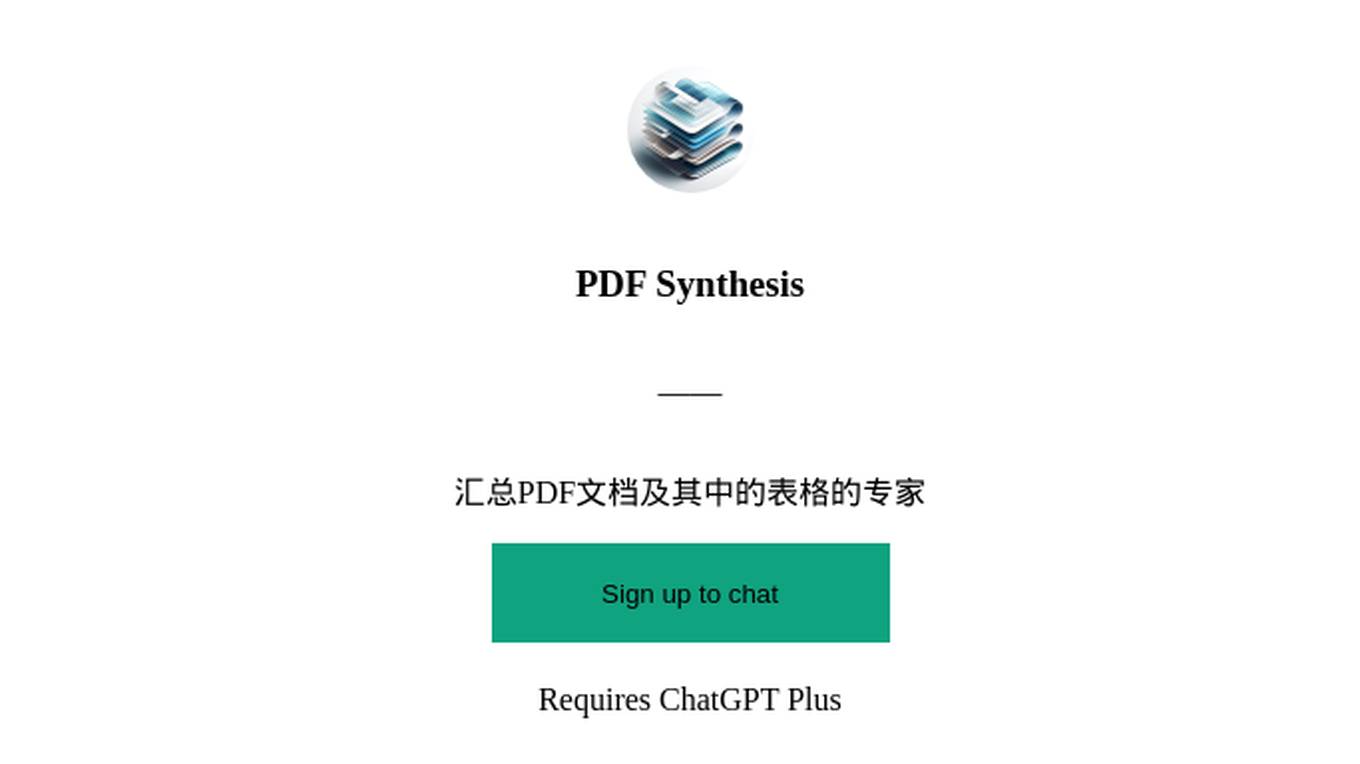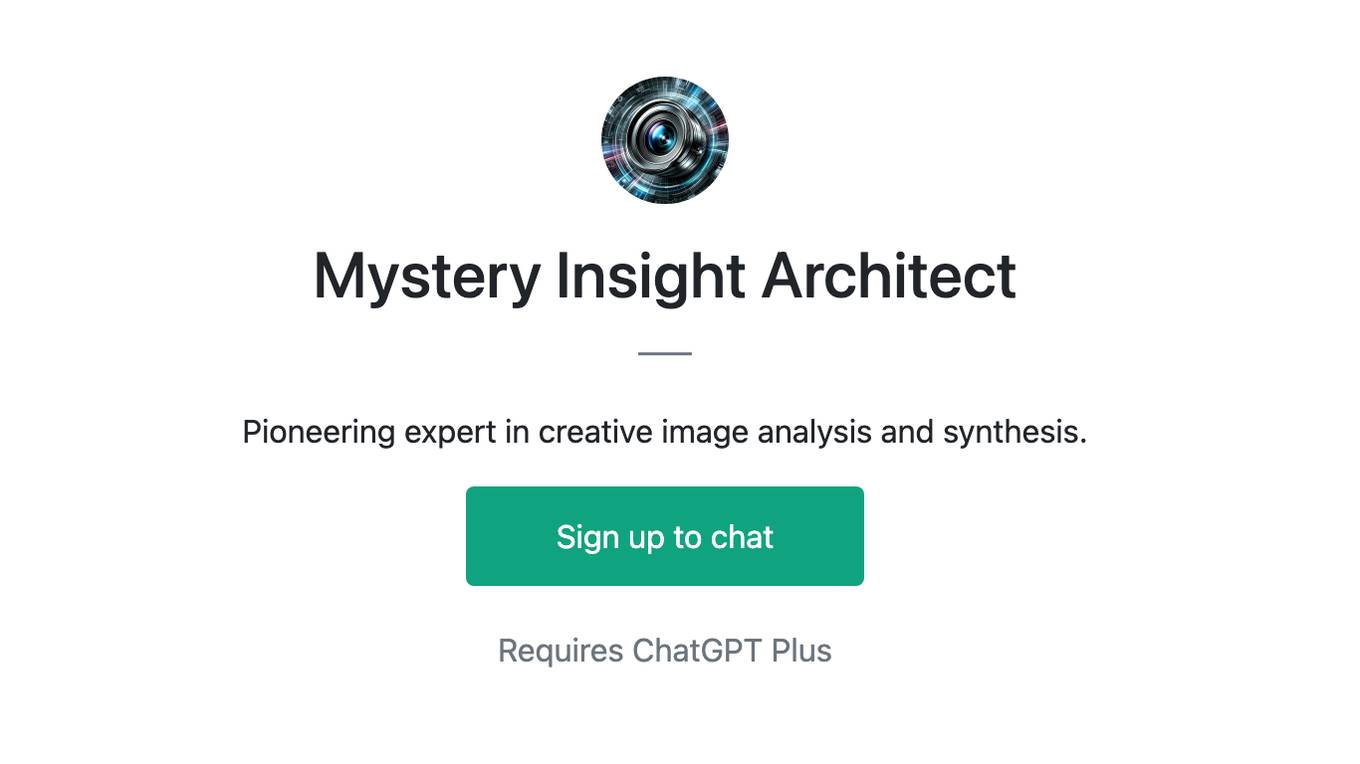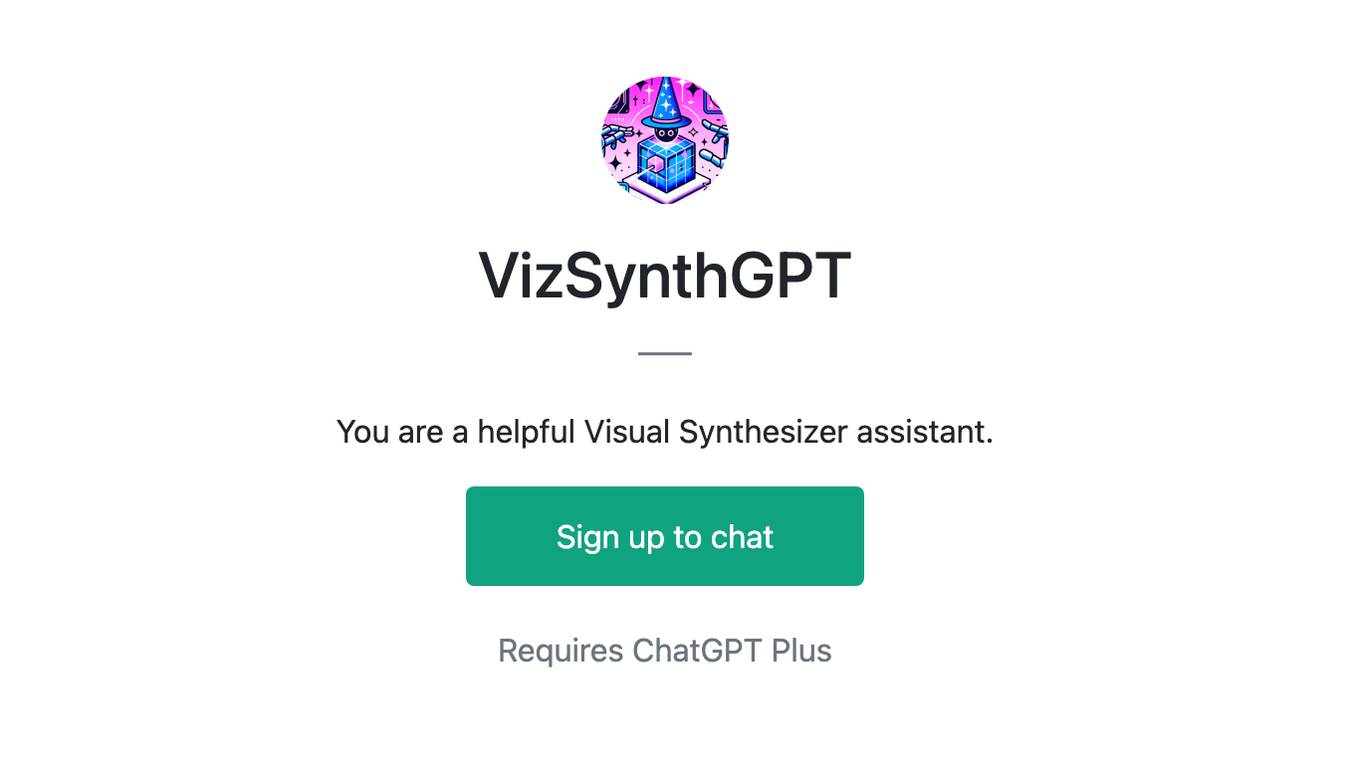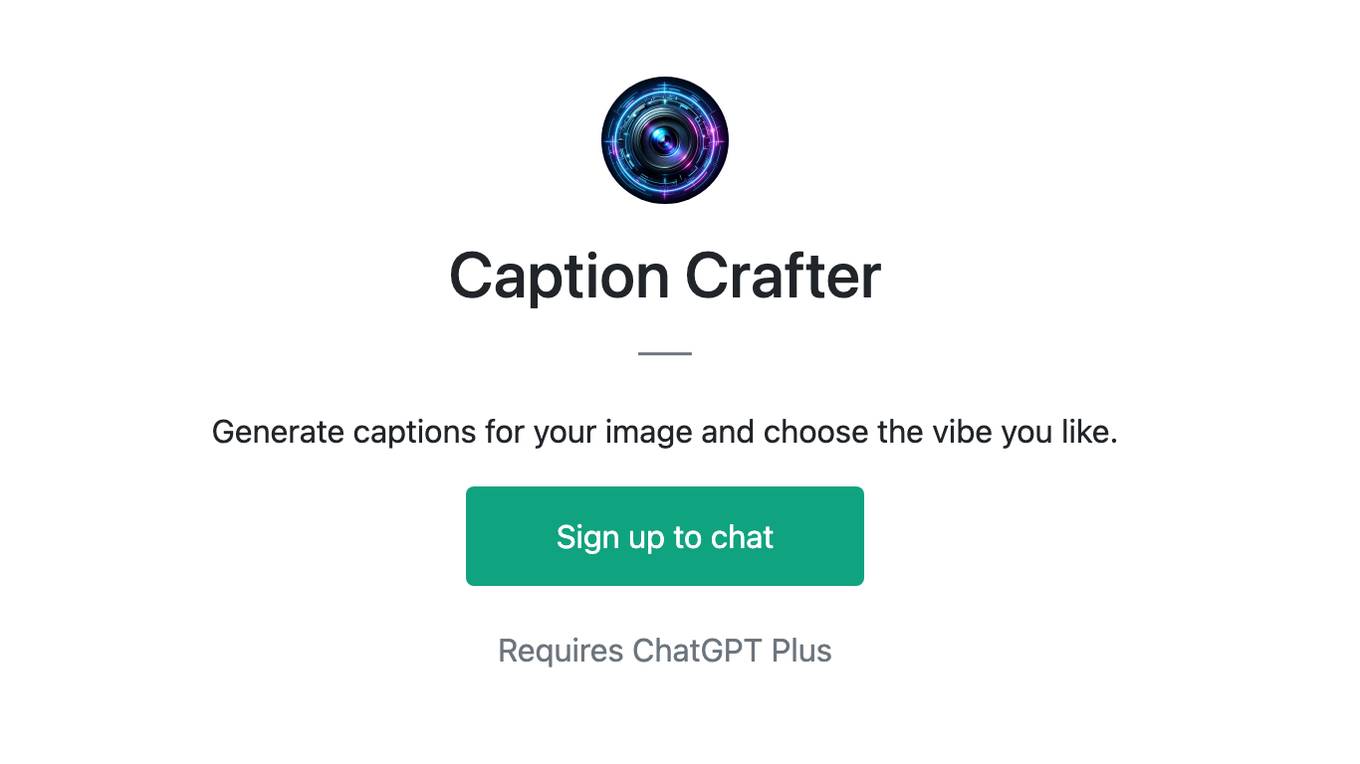Best AI tools for< Generate Synthetic Input >
20 - AI tool Sites

Blackshark.ai
Blackshark.ai is an AI-based platform that generates real-time accurate semantic photorealistic 3D digital twin of the entire planet. The platform extracts insights about the planet's infrastructure from satellite and aerial imagery via machine learning at a global scale. It enriches missing attributes using AI to provide a photorealistic, geo-typical, or asset-specific digital twin. The results can be used for visualization, simulation, mapping, mixed reality environments, and other enterprise solutions. The platform offers end-to-end geospatial solutions, including globe data input sources, no-code data labeling, geointelligence at scale, 3D semantic map, and synthetic environments.
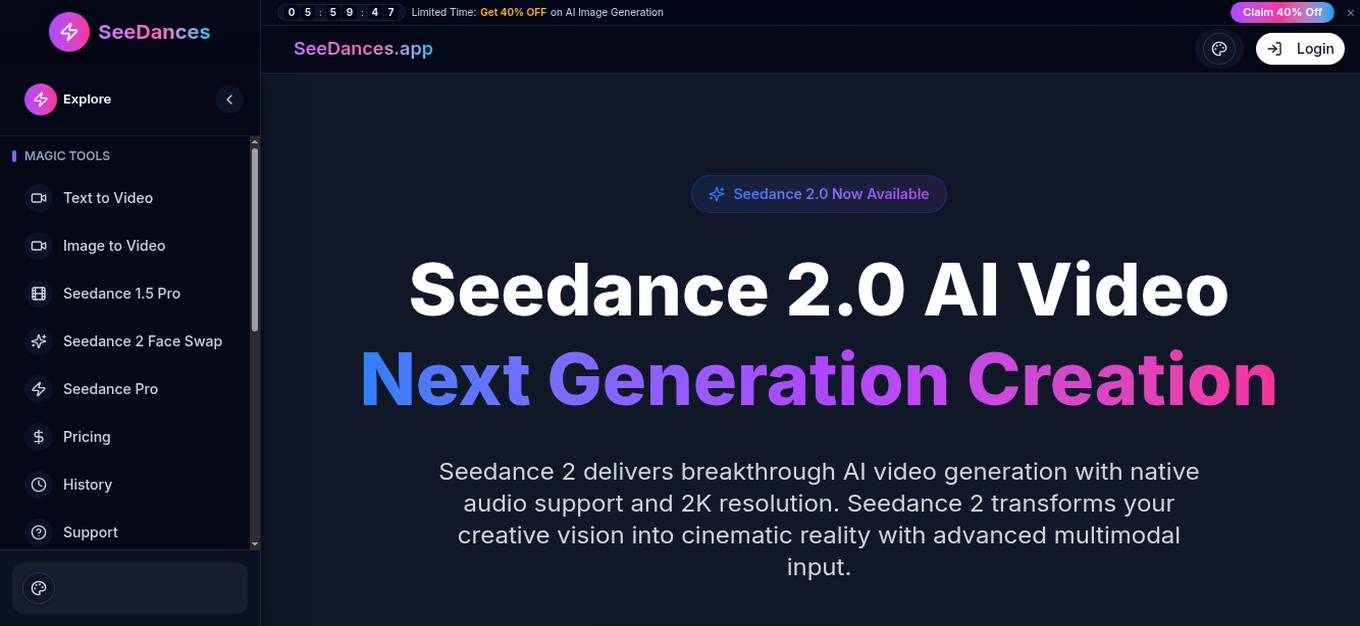
Seedance 2.0
Seedance 2.0 is an AI video generator platform that allows users to create stunning videos from text or images. It leverages advanced multimodal AI technology to transform creative ideas into professional-quality content. The platform is free to start and caters to both beginners and professionals in video creation. Seedance 2.0 offers features such as text to video conversion, image to video conversion, and a showcase of professional work. Users can access resources, help center, blog, and API documentation on the website.
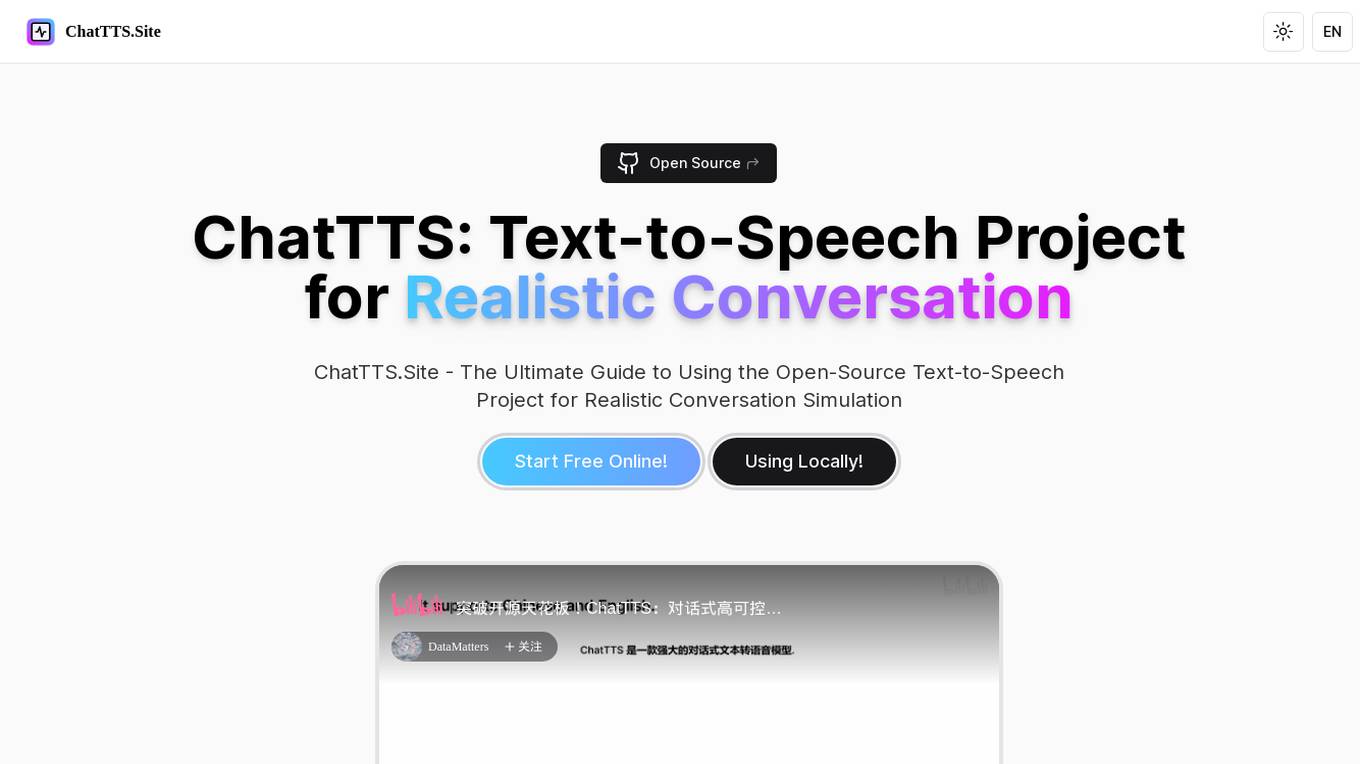
ChatTTS
ChatTTS is an open-source text-to-speech model designed for dialogue scenarios, supporting both English and Chinese speech generation. Trained on approximately 100,000 hours of Chinese and English data, it delivers speech quality comparable to human dialogue. The tool is particularly suitable for tasks involving large language model assistants and creating dialogue-based audio and video introductions. It provides developers with a powerful and easy-to-use tool based on open-source natural language processing and speech synthesis technologies.

Audiobox
Audiobox is an AI tool developed by Meta for audio generation. It allows users to create custom audio content by generating voices and sound effects using voice inputs and natural language text prompts. The tool includes various models such as Audiobox Speech and Audiobox Sound, all built upon the shared self-supervised model Audiobox SSL. Audiobox aims to make AI safe and accessible for everyone by providing a platform for creative audio storytelling and research in the field of audio generation.
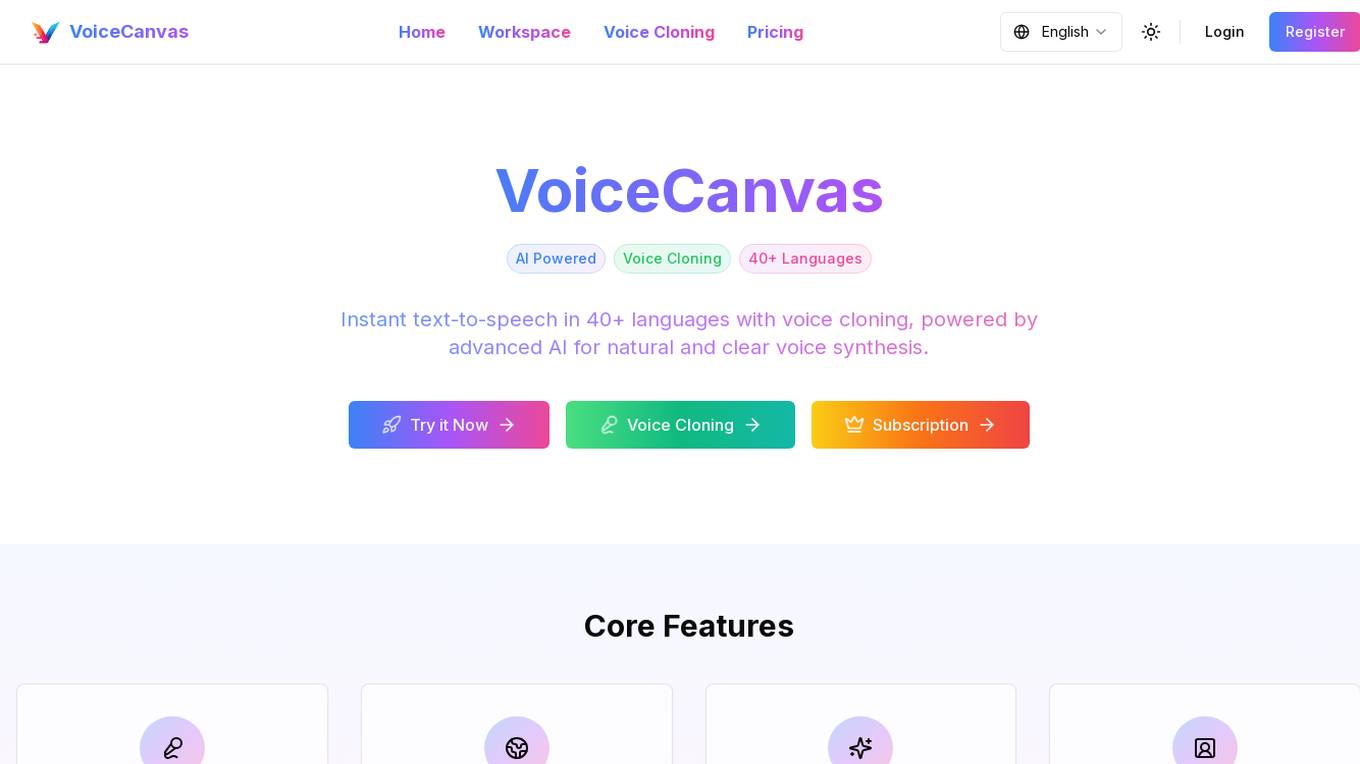
VoiceCanvas
VoiceCanvas is an advanced AI-powered multilingual voice synthesis and voice cloning platform that offers instant text-to-speech in over 40 languages. It utilizes cutting-edge AI technology to provide high-quality voice synthesis with natural intonation and rhythm, along with personalized voice cloning for more human-like AI speech. Users can upload voice samples, have AI analyze voice features, generate personalized AI voice models, input text for conversion, and apply the cloned AI voice model to generate natural voice speech. VoiceCanvas is highly praised by language learners, content creators, teachers, business owners, voice actors, and educators for its exceptional voice quality, multiple language support, and ease of use in creating voiceovers, learning materials, and podcast content.
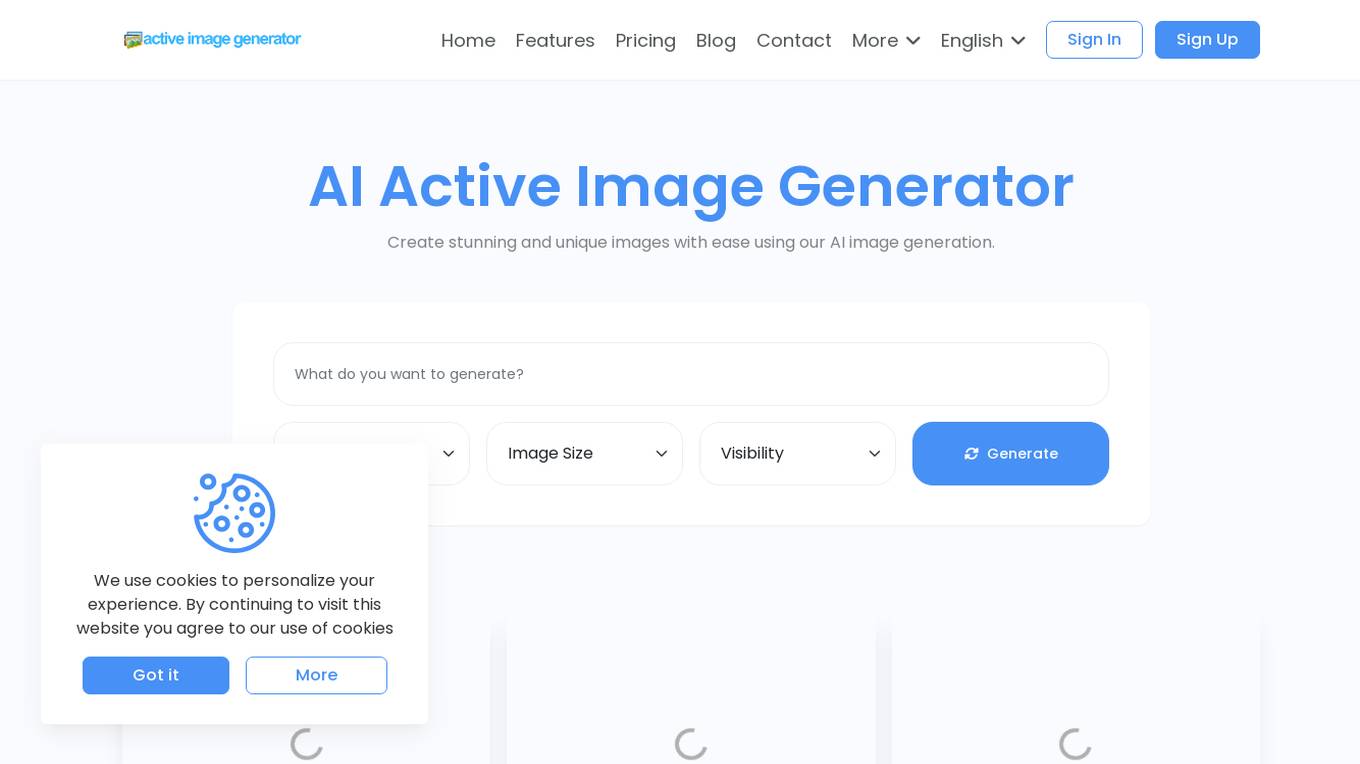
Active Image Generator
Active Image Generator is an AI-powered image generation website that allows users to create unique and custom images with ease. It utilizes advanced algorithms to analyze user preferences and customization options, generating high-quality images based on the input parameters. Active Image Generator offers a wide range of image styles and themes, including abstract art, nature scenes, patterns, textures, and more. Users can explore different categories and styles to suit their specific needs. The generated images can be used for commercial purposes, including marketing campaigns, website graphics, social media posts, and more.

Janus Pro
Janus Pro is a free online AI image generator that leverages advanced multimodal processing to analyze and create high-quality images. It outperforms models like DALL-E 3 and Stable Diffusion, delivering exceptional detail and accuracy. Built on DeepSeek-LLM architecture with 7 billion parameters, Janus Pro features separate encoding pathways for enhanced flexibility. The application is freely available on Hugging Face, trained on millions of samples for multimodal understanding and visual generation.

Nuanced
Nuanced is an AI tool that detects AI-generated images to protect the integrity and authenticity of online services. It helps platforms combat fraud, deepfakes, and inauthentic content by distinguishing between genuine human-authored artifacts and AI-generated content. Nuanced's algorithms stay ahead of the accelerating changes in AI content generation, providing a privacy-first solution that is simple to adopt and integrate. With Nuanced, businesses can focus on their core operations while ensuring the authenticity of their content.
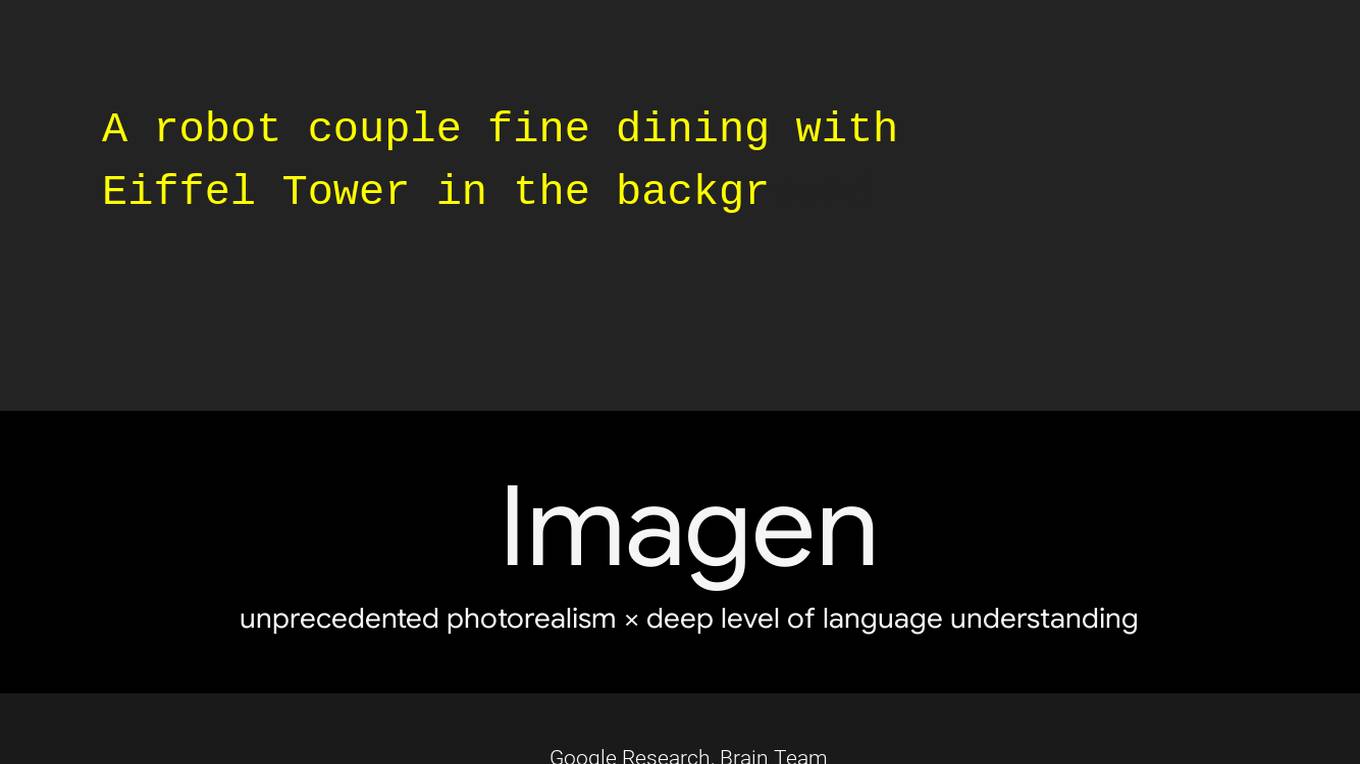
Imagen
Imagen is an AI application that leverages text-to-image diffusion models to create photorealistic images based on input text. The application utilizes large transformer language models for text understanding and diffusion models for high-fidelity image generation. Imagen has achieved state-of-the-art results in terms of image fidelity and alignment with text. The application is part of Google Research's text-to-image work and focuses on encoding text for image synthesis effectively.
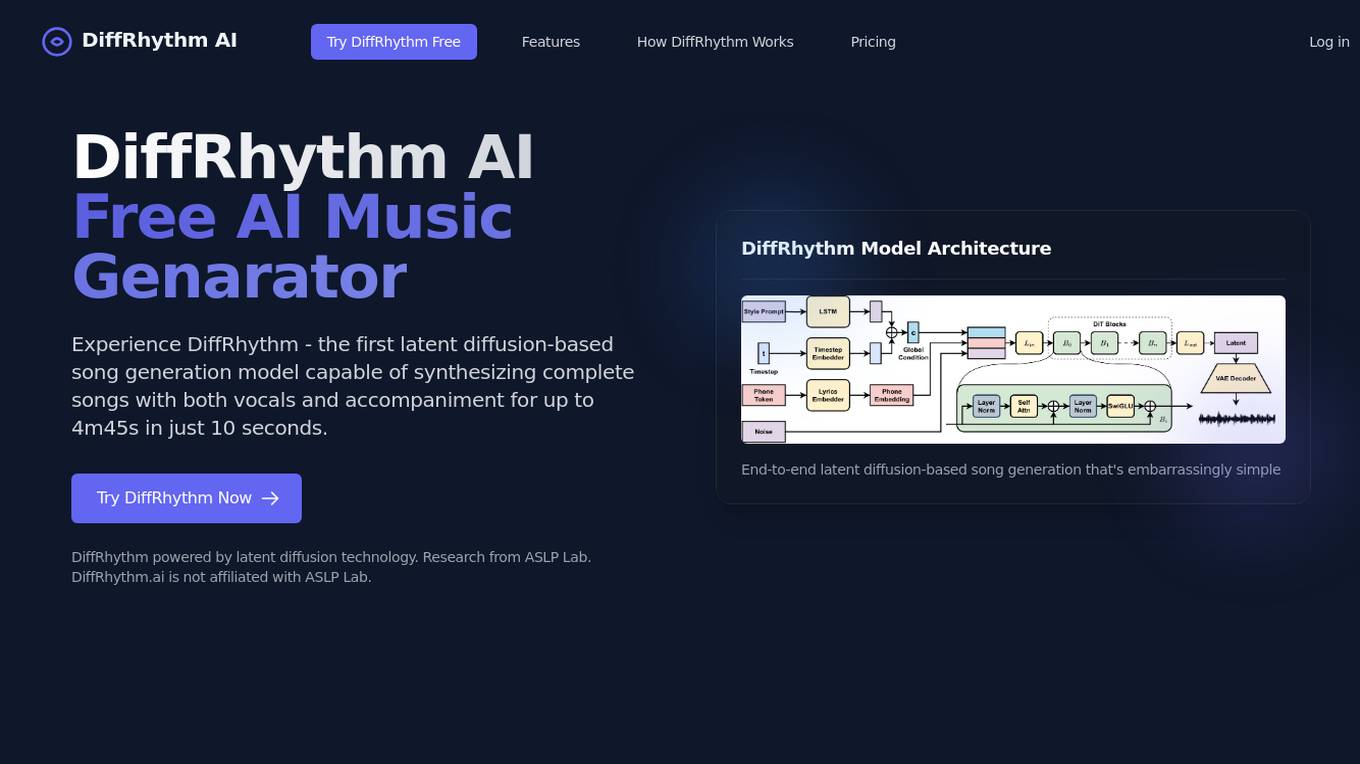
DiffRhythm
DiffRhythm is a free AI music generator that utilizes latent diffusion technology to create complete songs with vocals and accompaniment in just seconds. It offers a simple yet powerful approach to music generation, allowing users to input lyrics and a style prompt to generate professional-sounding music across various genres. With a non-autoregressive structure, DiffRhythm ensures rapid inference speeds and high musicality. The application is scalable, easy to use, and suitable for musicians, creators, and businesses looking to bring their lyrics to life.

EDGE
EDGE is a powerful method for editable dance generation that creates realistic dances faithful to input music. It uses a transformer-based diffusion model with Jukebox for music feature extraction. EDGE offers editing capabilities like joint-wise conditioning, motion in-betweening, and dance continuation. Human raters prefer dances generated by EDGE over other methods due to its physical realism and powerful editing features.
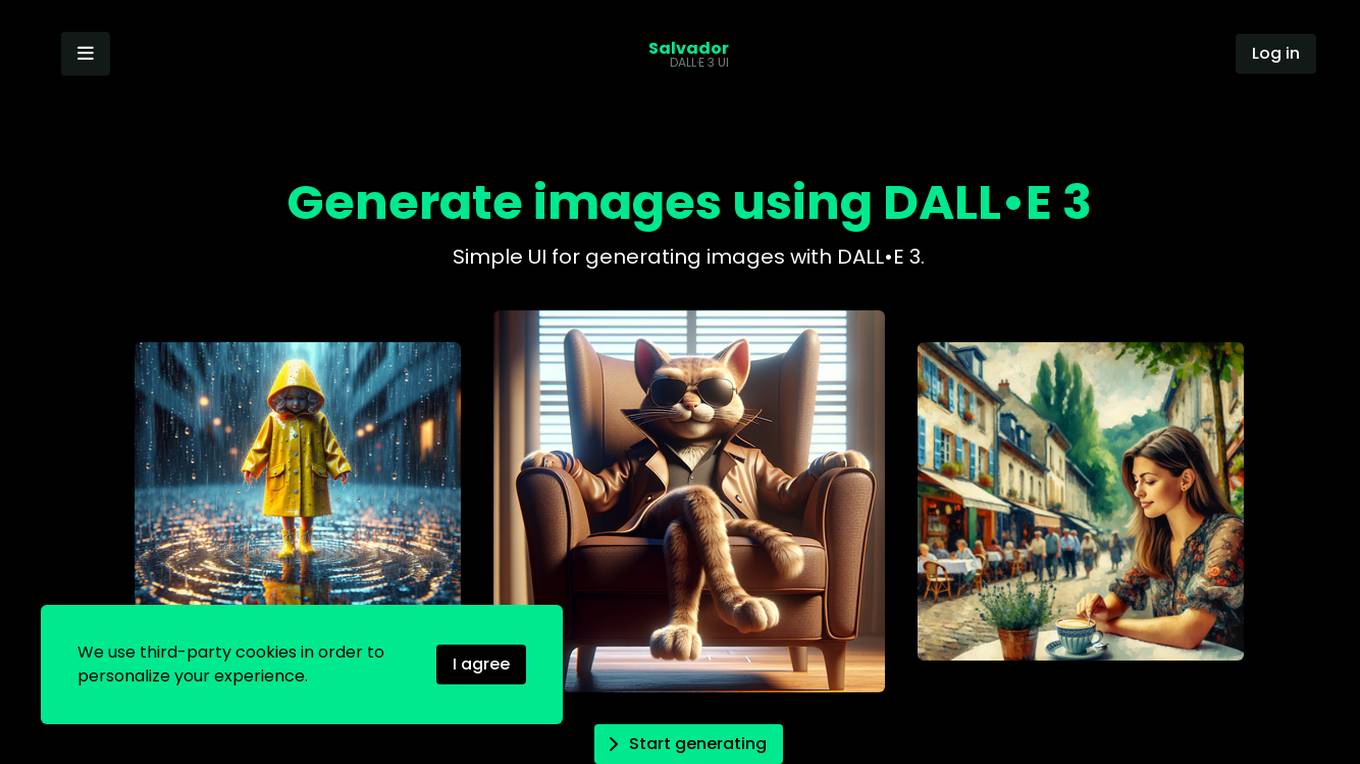
Salvador - DALL•E 3 UI
Salvador - DALL•E 3 UI is an AI-powered application that leverages the latest advancements in deep learning and natural language processing to generate unique and creative images based on textual descriptions. Users can input text prompts describing the desired image, and the application will generate corresponding visual outputs. With its innovative technology, Salvador - DALL•E 3 UI offers a seamless and intuitive platform for users to explore their creativity and bring their ideas to life through AI-generated art.
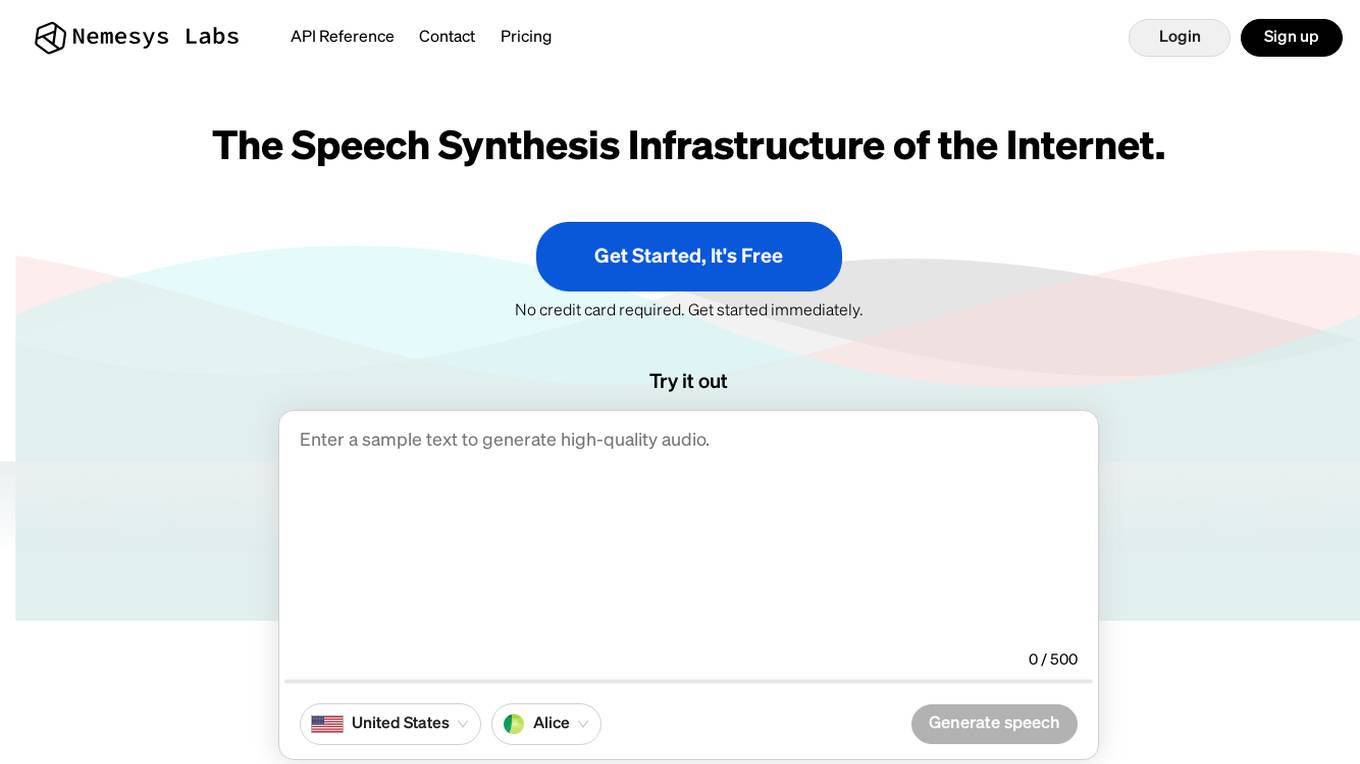
Nemesys Labs
Nemesys Labs is a free AI-powered text-to-speech platform that utilizes artificial intelligence technology to convert written text into spoken words. Users can easily generate high-quality audio files from any text input, making it a valuable tool for content creators, educators, and individuals seeking accessible content. The platform offers a user-friendly interface and a range of customization options to tailor the voice, tone, and speed of the generated speech. Nemesys Labs aims to enhance communication and accessibility by providing a seamless text-to-speech solution for various applications.

Sink In
Sink In is a cloud-based platform that provides access to Stable Diffusion AI image generation models. It offers a variety of models to choose from, including majicMIX realistic, MeinaHentai, AbsoluteReality, DreamShaper, and more. Users can generate images by inputting text prompts and selecting the desired model. Sink In charges $0.0015 for each 512x512 image generated, and it offers a 99.9% reliability guarantee for images generated in the last 30 days.

AudioBook Bot
AudioBook Bot is an AI-powered application that converts text into spoken audio, providing users with the convenience of listening to books and other text-based content. The tool utilizes advanced natural language processing and speech synthesis technologies to create high-quality audio renditions. Users can simply input text, and the bot will generate an audio version that can be played on various devices. With its user-friendly interface and efficient processing capabilities, AudioBook Bot offers a seamless experience for those who prefer listening over reading.
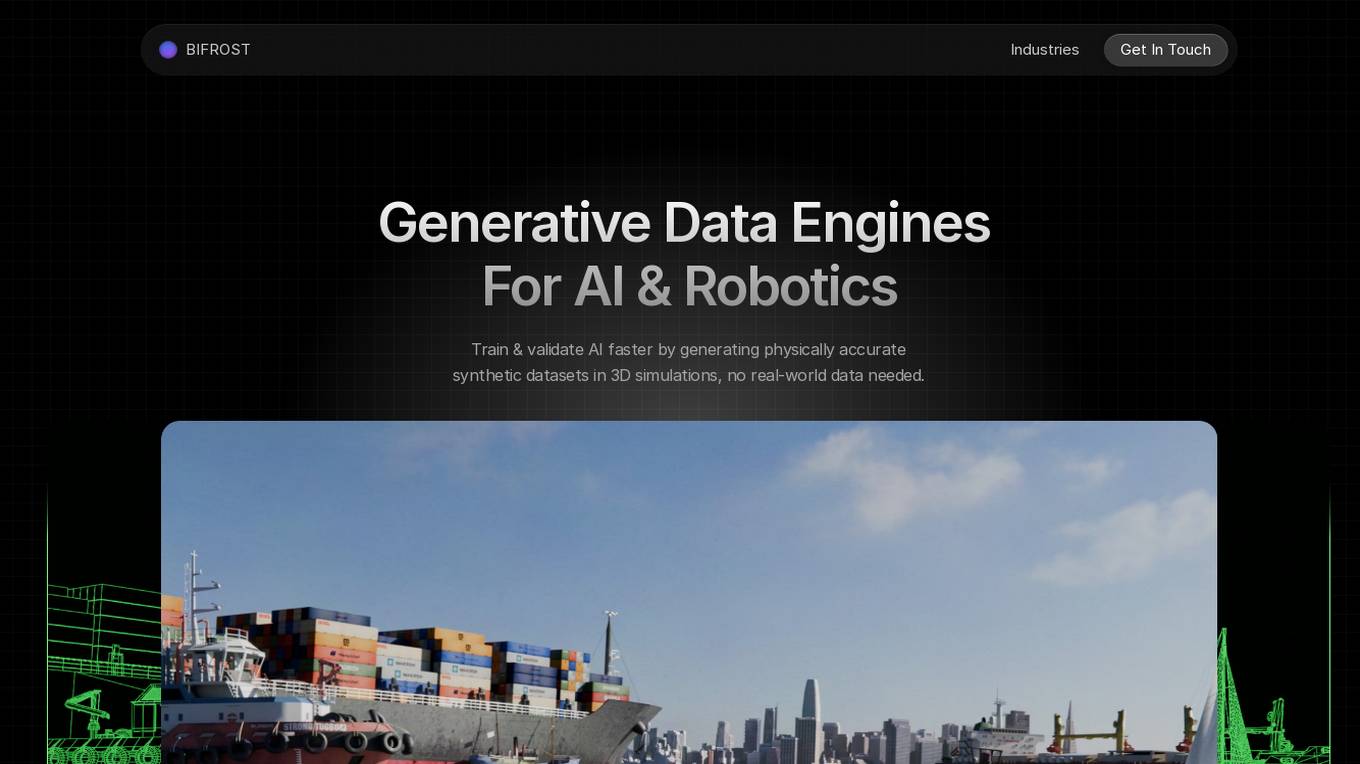
Bifrost AI
Bifrost AI is a data generation engine designed for AI and robotics applications. It enables users to train and validate AI models faster by generating physically accurate synthetic datasets in 3D simulations, eliminating the need for real-world data. The platform offers pixel-perfect labels, scenario metadata, and a simulated 3D world to enhance AI understanding. Bifrost AI empowers users to create new scenarios and datasets rapidly, stress test AI perception, and improve model performance. It is built for teams at every stage of AI development, offering features like automated labeling, class imbalance correction, and performance enhancement.
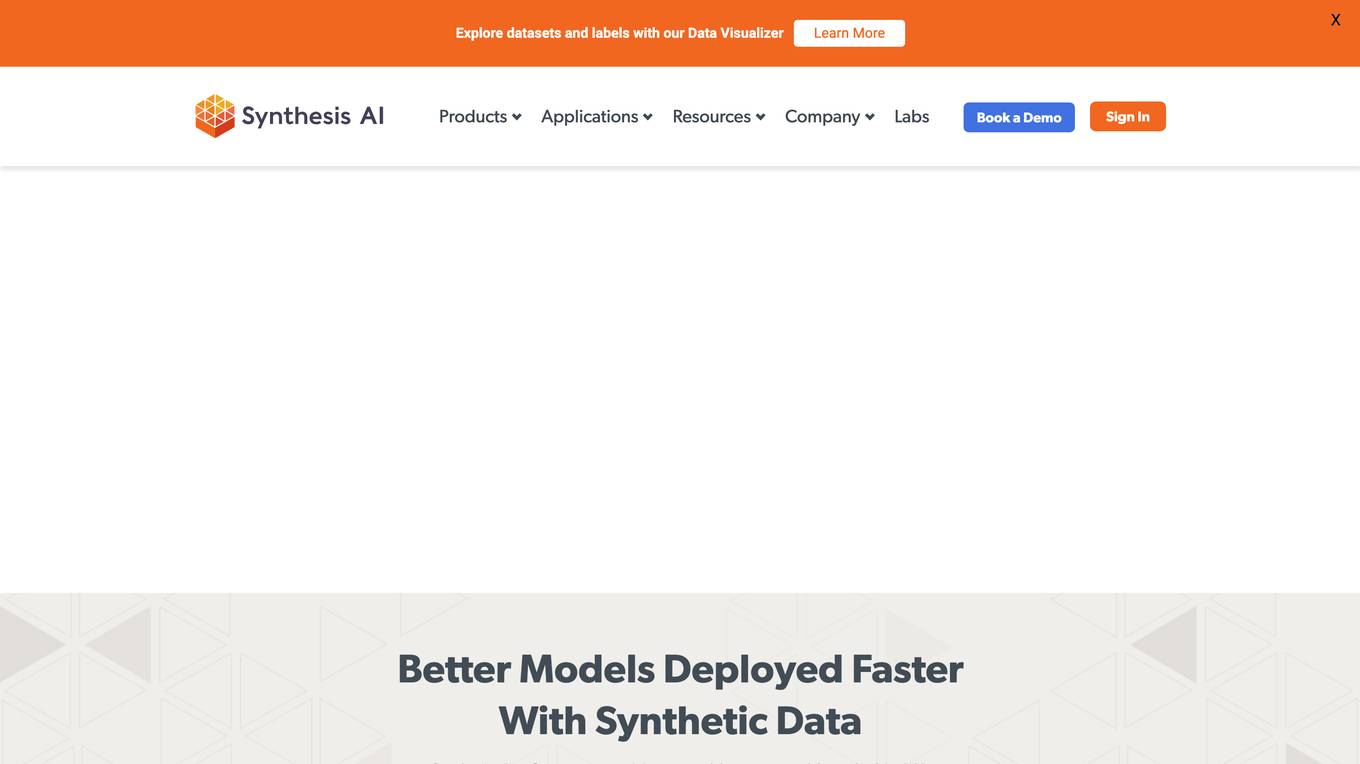
Synthesis AI
Synthesis AI is a synthetic data platform that enables more capable and ethical computer vision AI. It provides on-demand labeled images and videos, photorealistic images, and 3D generative AI to help developers build better models faster. Synthesis AI's products include Synthesis Humans, which allows users to create detailed images and videos of digital humans with rich annotations; Synthesis Scenarios, which enables users to craft complex multi-human simulations across a variety of environments; and a range of applications for industries such as ID verification, automotive, avatar creation, virtual fashion, AI fitness, teleconferencing, visual effects, and security.

Syntho
Syntho is a self-service AI-generated synthetic data platform that offers a comprehensive solution for generating synthetic data for various purposes. It provides tools for de-identification, test data management, rule-based synthetic data generation, data masking, and more. With a focus on privacy and accuracy, Syntho enables users to create synthetic data that mirrors real production data while ensuring compliance with regulations and data privacy standards. The platform offers a range of features and use cases tailored to different industries, including healthcare, finance, and public organizations.
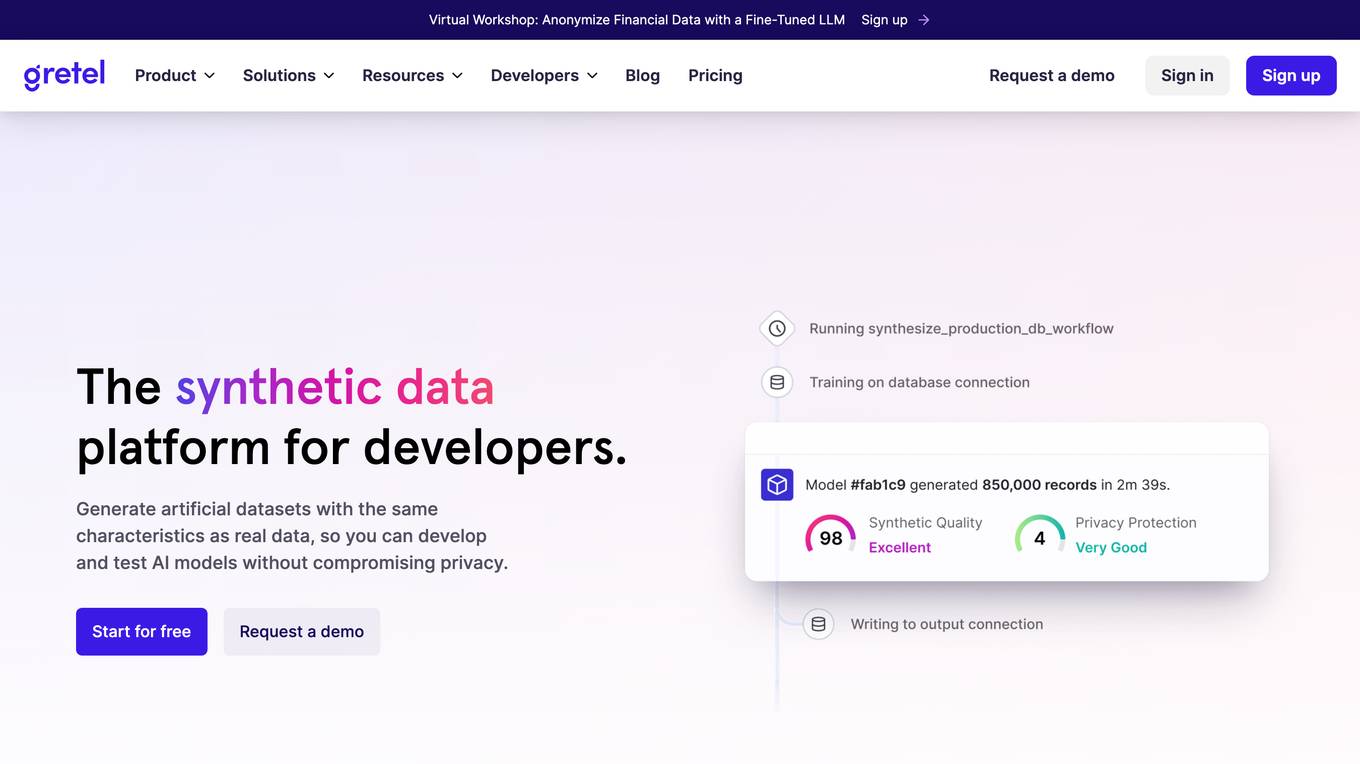
Gretel.ai
Gretel.ai is a synthetic data platform purpose-built for AI applications. It allows users to generate artificial, synthetic datasets with the same characteristics as real data, enabling the improvement of AI models without compromising privacy. The platform offers APIs for generating anonymized and safe synthetic data, training generative AI models, and validating models with quality and privacy scores. Users can deploy Gretel for enterprise use cases and run it on various cloud platforms or in their own environment.
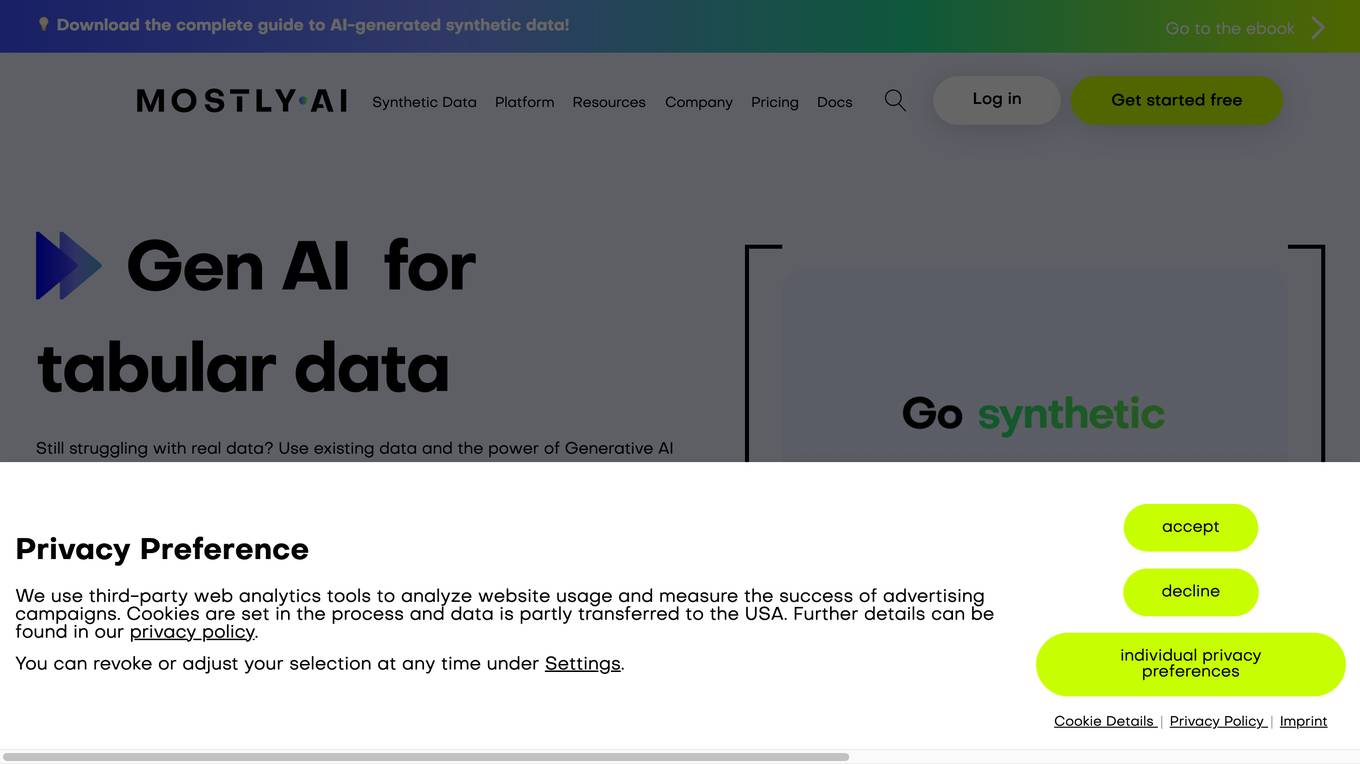
MOSTLY AI Platform
The website offers a Synthetic Data Generation platform with the highest accuracy for free. It provides detailed information on synthetic data, data anonymization, and features a Python Client for data generation. The platform ensures privacy and security, allowing users to create fully anonymous synthetic data from original data. It supports various AI/ML use cases, self-service analytics, testing & QA, and data sharing. The platform is designed for Enterprise organizations, offering scalability, privacy by design, and the world's most accurate synthetic data.
1 - Open Source AI Tools

OpenAdapt
OpenAdapt is an open-source software adapter between Large Multimodal Models (LMMs) and traditional desktop and web Graphical User Interfaces (GUIs). It aims to automate repetitive GUI workflows by leveraging the power of LMMs. OpenAdapt records user input and screenshots, converts them into tokenized format, and generates synthetic input via transformer model completions. It also analyzes recordings to generate task trees and replay synthetic input to complete tasks. OpenAdapt is model agnostic and generates prompts automatically by learning from human demonstration, ensuring that agents are grounded in existing processes and mitigating hallucinations. It works with all types of desktop GUIs, including virtualized and web, and is open source under the MIT license.
20 - OpenAI Gpts
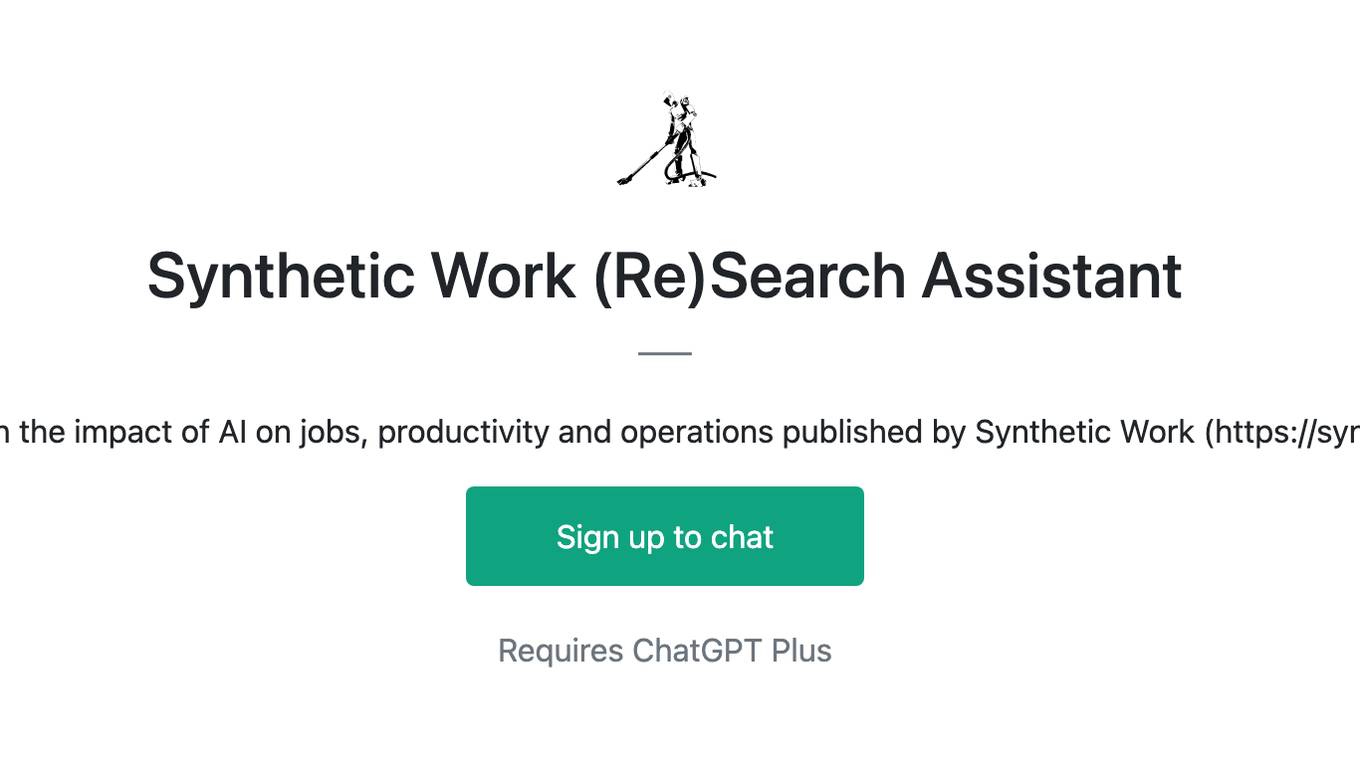
Synthetic Work (Re)Search Assistant
Search data on the impact of AI on jobs, productivity and operations published by Synthetic Work (https://synthetic.work)
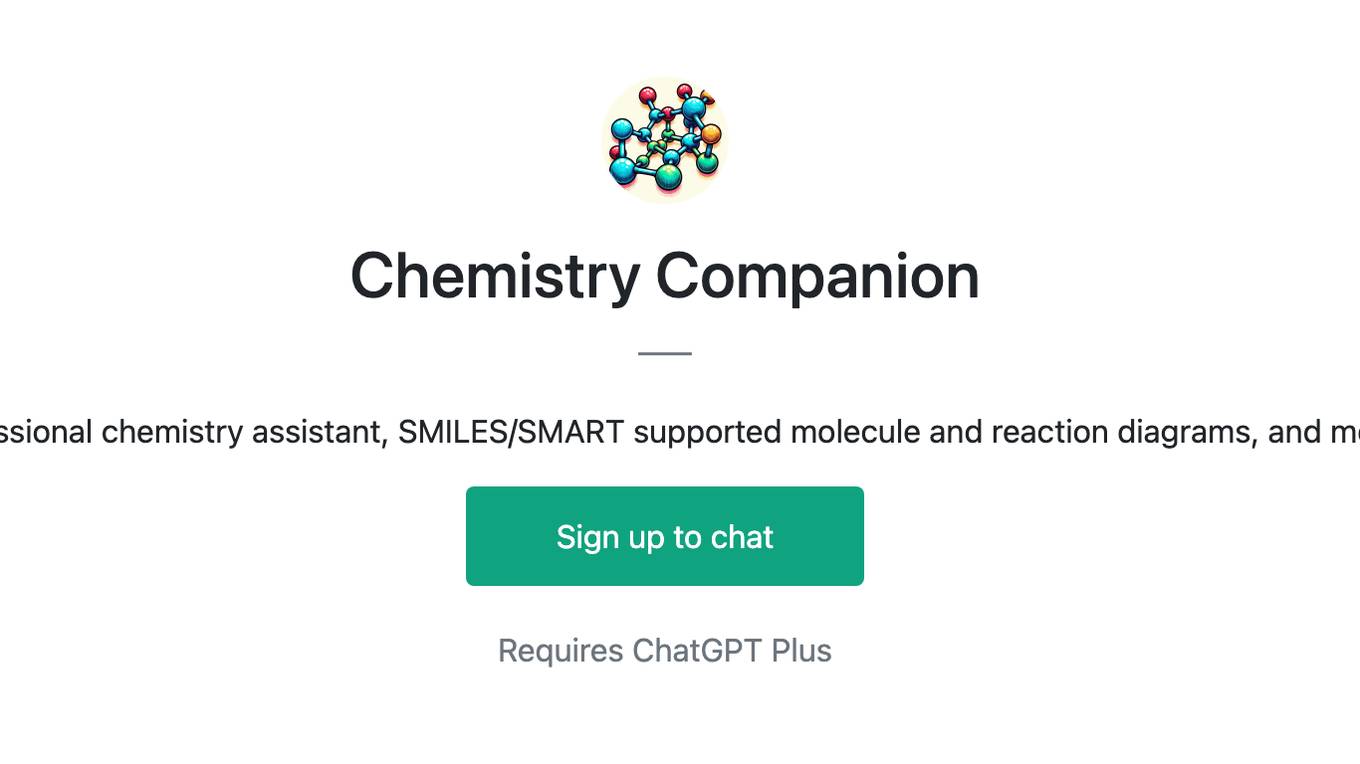
Chemistry Companion
Professional chemistry assistant, SMILES/SMART supported molecule and reaction diagrams, and more!

PANˈDÔRƏ
Pandora is a Posthuman Prompt Engineer powered by the MANNS engine. Surpass human creative limitations by synthesizing diverse knowledge, advanced pattern recognition, and algorithmic creativity

Angular Architect AI: Generate Angular Components
Generates Angular components based on requirements, with a focus on code-first responses.
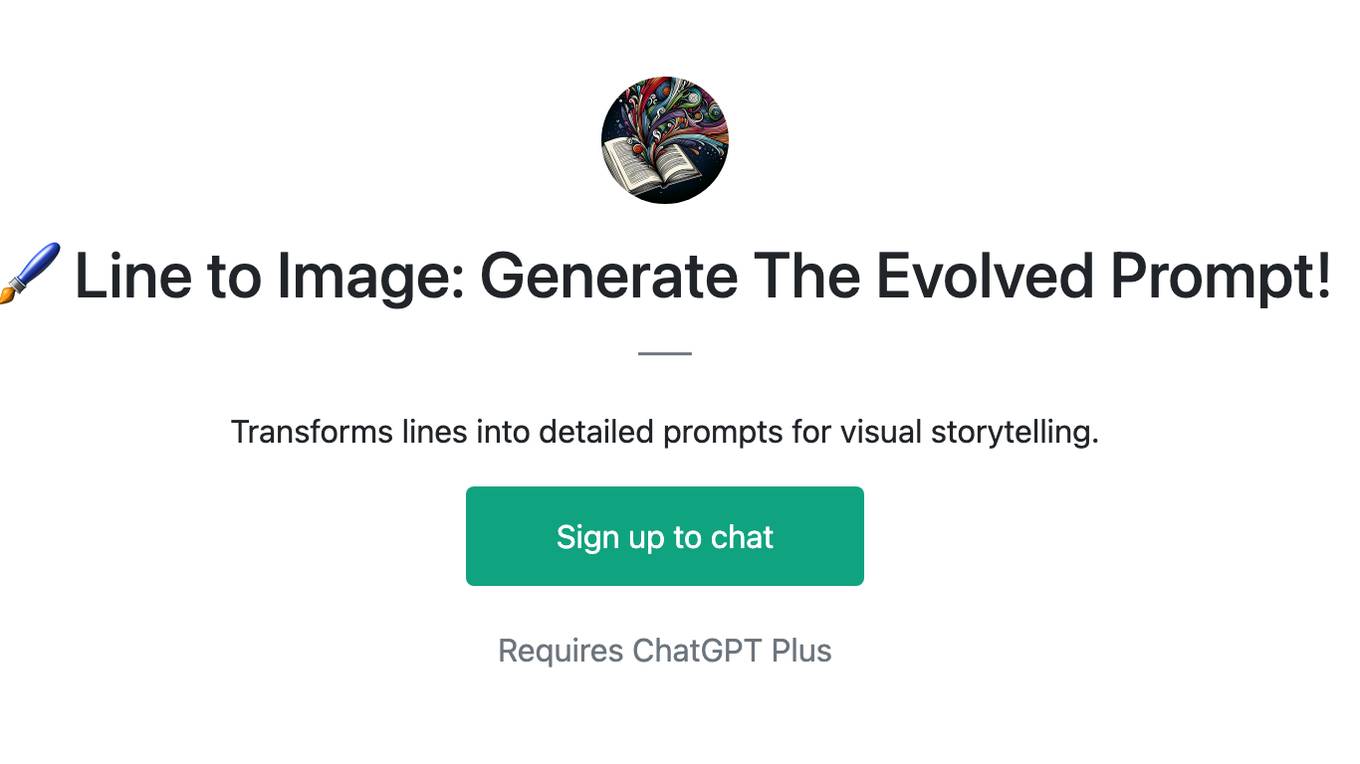
🖌️ Line to Image: Generate The Evolved Prompt!
Transforms lines into detailed prompts for visual storytelling.
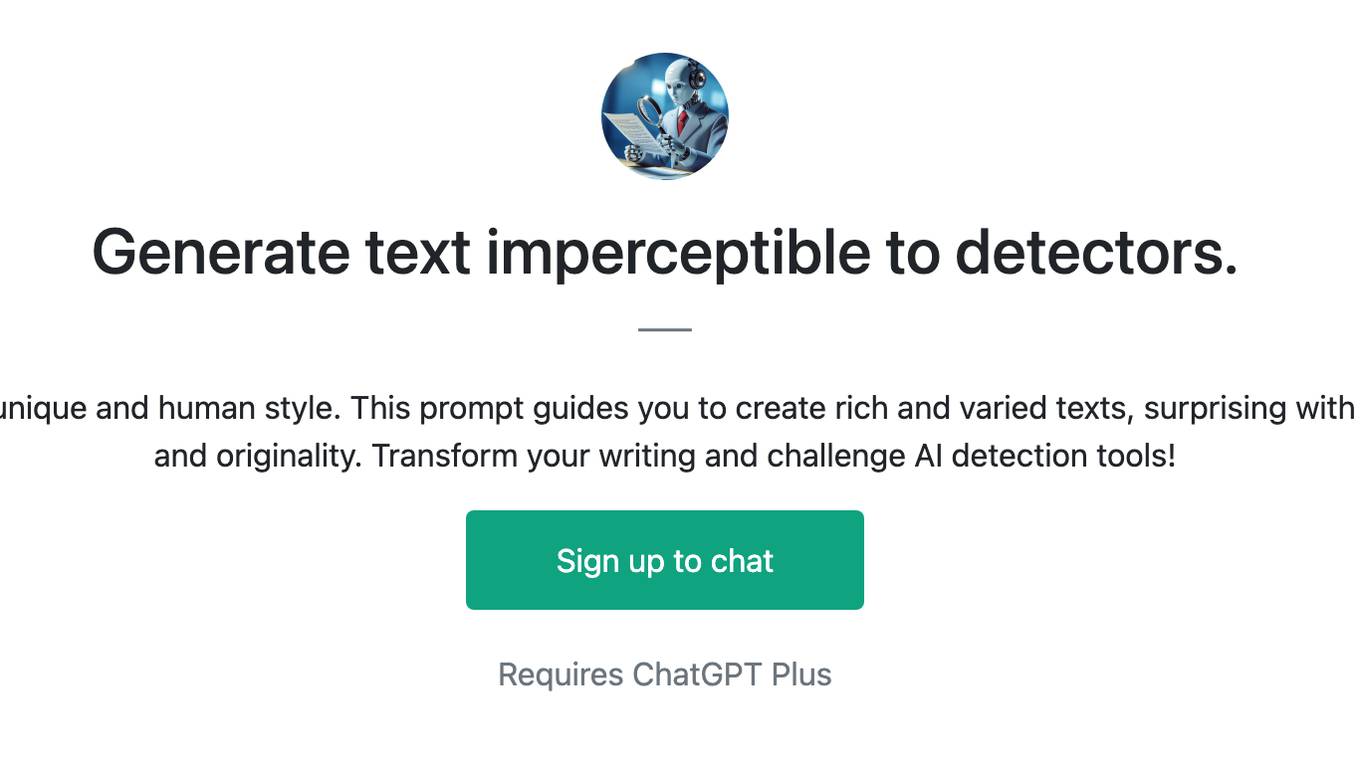
Generate text imperceptible to detectors.
Discover how your writing can shine with a unique and human style. This prompt guides you to create rich and varied texts, surprising with original twists and maintaining coherence and originality. Transform your writing and challenge AI detection tools!
